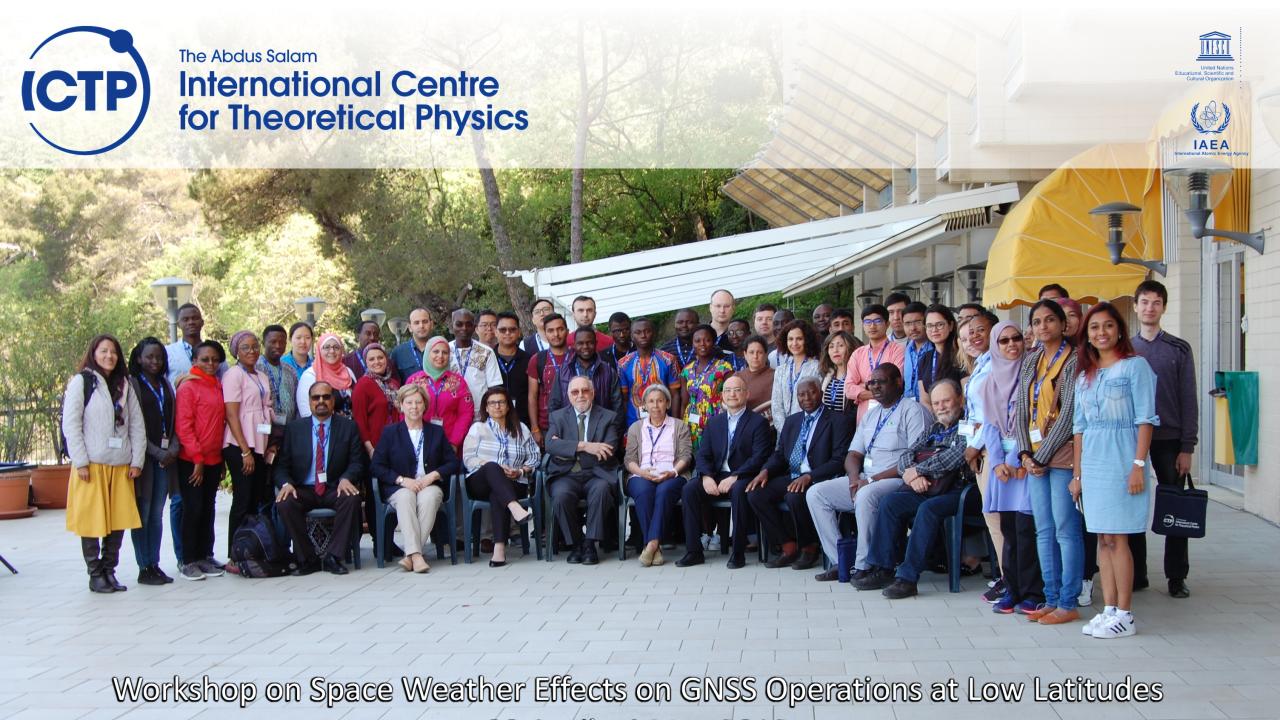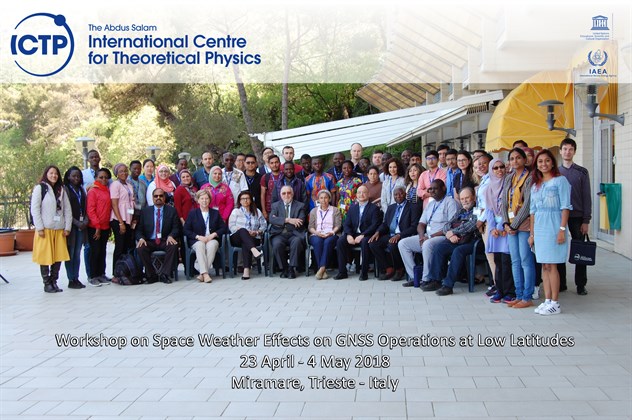
Space weather is the variation in Sun energy emissions, solar wind, magnetosphere, ionosphere and thermosphere, which can influence the performance and reliability of a variety of space borne and ground-based technological systems. As such, space weather is recognized as a cause of significant errors experienced by Global Satellite Navigation Systems (GNSS), Satellite Based Augmentation Systems (SBAS) and their users. GNSS or SBAS signals propagate from a satellite to the user receiver and, while passing through the ionosphere, their quality is affected by the damaging effects of space weather. These effects are particularly critical at low latitudes, where most of the developing countries are located.
From 23 April to 4 May, ICTP hosted the “Workshop on Space Weather Effects on GNSS Operations at Low Latitudes” with the purpose to provide theoretical and practical training on the physics of space weather to scientists from all over the world. The workshop was the tenth in a series of activities in the field carried out since 2009 by the ICTP T/ICT4D in partnership with the Institute for Scientific Research (ISR) at Boston College, and done with the collaboration of the International Committee on GNSS of the UN Office of Outer Space Affairs and The Institute of Navigation both in Trieste and in Africa.
A review about the impact of these training efforts on the capacity building in the field in Africa and in developing countries in general opened the workshop. We asked more about these topics to Professor Babatunde Rabiu, Director of the Centre for Atmospheric Research in Anyigba (Nigeria), who attended the meeting.
Professor Rabiu, was this your first workshop at ICTP?
I first came in 2006 and, since then, I have attended more than 15 workshops and I have been involved in the organization of many.
How have these meetings evolved over time?
This one was the tenth edition of a series started in 2009. Even if the general topics may seem the same, contents greatly changed from one to the next: I have never attended a presentation repeating what was done before. Speakers come with some innovation, with different approaches every time. Over time, workshops like this one have assumed a less teaching approach in favor of a more interactive one: now there are more hands-on experience sessions.
What is your main research field?
I work in space weather physics in Nigeria, where I direct the Centre for Atmospheric Research. In particular, my research aims to improve our understanding of equatorial ionosphere which results to be more complex from what you find at middle latitudes and some other places. First of all, the magnetic equator passes through that area, which makes this region quite peculiar from a scientific point of view. In addition, a complex ionospheric current passes through it: our studies enabled us to evaluate with almost 100% accuracy all the parameters of this current by applying a precise model. This will have positive contributions to modeling ionospheric processes, with great implications on the forecasting of space weather activities, communications and GNSS navigation. In fact, we collaborate with professors from several universities, but also with space and communication industries.
What do you personally get from this kind of activity?
Apart from having received very interesting lectures, I have had the chance to establish an international and consolidated network among the participants. We happen to take ideas from other scientists and professionals, to form alliances, to co-supervise students across national borders.
In what sense do workshops like this one have an impact?
I think this particular workshop has greatly impacted Africa over time, in many different ways. It has enhanced institutional output and facilitated local training of PhDs and MS students in Africa, consequently reducing brain drain: researchers can stay, carry out their research and become professionals in their home countries, they can train new students and send them out for workshops and conferences. Another interesting effect has been the tremendous increase of scientific production in terms of publications: if compared to 2009, when this workshop started, there has been over 100% increase in the number of publications in the field in top journals by African scientists. One of the main reasons, I think, is that during the workshop we are able to have access, get trained and share open source software. Later on, scientists can use these tools in their university, to train students or for their research. In my research centre, we used to struggle with publishing in top journals; now we have up to 10, 15 articles per year. We are put in the condition to pursue what I personally define as “internationally competitive research”.
Another interesting point to highlight is that this workshop has enabled some countries in Africa to begin to invest in this kind of research. Most people used to come to this workshop with full support from ICTP but now some national organizations have started supporting students to attend. This year, for example, Nigeria has supported travel expenses for three participants. In a way, it has catalyzed a national participation in GNSS and space weather research, giving hope to future scientists.
 |
--- Anna Lombardi
















